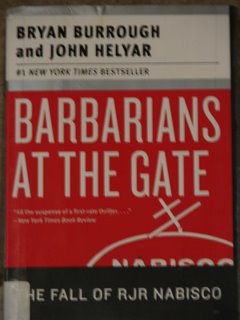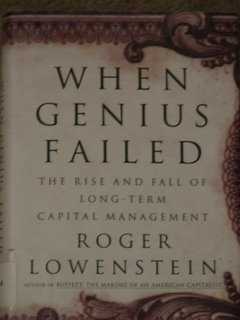The two books I read, both of them, are about the rarefied worlds of finance. The first one, Barbarians at the Gate: The Fall of RJR Nabisco, is a quite old one. It is a cult classic now and a prescribed reading for many business schools. It is about the sale of the tobacco and food giant, RJR Nabisco. Then in the 80s the sale was for a record 24 odd billion dollars. The peculiar thing is that the buyers, a consortium led by KKR group, put a fraction of the sale amount from their own pockets. Rest was borrowed money to be repaid from the company's cashflow itself. The borrowed part was made up of different flavours of junk bonds. After the bidding war starts, the management group led by chairman Ross Johnson tries to buy the company for its own. The advantage was they knew exactly how much the company was worth and hence how high they can bid. Still they fail in their bid and the tale is taut and spell binding given the fact that everyone knows the end. Poker play with nail-biting finish.

The other book, "When Genius Failed: The Rise and Fall of Long-Term Capital Management " is a much recent one. It is about the late 1990's boom and implosion of a firm called, Long Term Capital Management. The name might be dreary, but not the people behind it. The option pricing gurus, Myron Scholes (of Black Scholes equation fame) and Robert Merton lead the think tank. All the trades (derivative contracts) are made by using the formula they devise and fine tune. They indulge in global arbitraging and shrewdly build up their portfolio. The unique thing is it is very little of their money as in derivative contracts only the margin is required to be paid upfront. So entire cash available need not be allocated to a single investment and multiple "trades" can be done by small investing margins in each. So compared to the investment amount, the returns are huge (leveraging), even obscene.It is a sort of a gamble, no matter how educated their guess is. The downside is when the contract is out of the money, they have to pay, and how! But the traders of Long Term Capital Management are sure about their formulae and bell curves and calculate that the tail of the bell curve will occur only once in a million years! Ofcourse, it doesn't happen that way and there the story begins. While they are part of the firm, both Scholes and Merton are awarded the economics Nobel (Fischer Black is dead by then) and their prestige increases. Way to go before a fall! The story makes rivetting reading. Only problem is while the Barbarians at the gate was constructed from interviews with all the persons involved, "When Genius Failed.." author Roger Lowenstein was given no official interviews. He has constructed the book purely based on hearsay and painstaking research work.

The authors of both the books give cursory treatment to the finance theory which is the bedrock of the dealings, almost afraid of scaring off the lay readers. Maybe they should have explained a little bit more even though it would've meant less drama and action. For example, the spine of "When Genius Failed" is the premise that the present discounted value of a bond will converge to its face value plus interest, over time; And how it didn't work out that way. The LTCM bets on the convergence. They pick out the tiny divergent "wrinkles" that exist in the market making money when the "wrinkles" are ironed out. When the two values (traded and guaranteed) diverge, the bottom falls out of the firm. I couldn't understand how such a scenario will happen naturally. Ofcourse artificial bear "hugs" of the stock market are possible but they last for a very short time. The LTCM geniuses too failed to understand such a thing will happen and thus they went bust. Atleast here I am in exalted company!
I'd recommend both the books to anyone. And to my friends I'd insist they buy them so that I can borrow for a second reading and subsequently decorate my bookshelf!
:-)

7 comments:
RJR Nabrisco is truly a classic.... read fully about it as a case down at IIMA... illustrated a lot of things in addition to the behavioural aspects of the target company board....
I will try to check out the second one... though I do think that in a lot of cases, the convergence to the face value would not happen especially for mortgage bonds... (like in the 80s with Salomon Brothers) if we relax certain assumptions of Black Scholes.
seems like heavy reading..
@naveen - I'll explain more abt convergence when you come this weekend. Convergence will happen, scholes equation or not. It is basic common sense. Only divergence begs an explanation.
point5 - It's actually very light reading. They go like novels. No equations.
Seems like you are lover of books:-))
sorry i didnt read the post fully :D :D :D i think im not old enuff to read non-fiction :D :D hehe cant read anything with a moral or a lesson involved :D but i read looooooooadsa fiction!!!!!!!!!
and yes, im back! :D
I have been waiting to get some good book recommendations... currently reading vernon god little..:)
Post a Comment